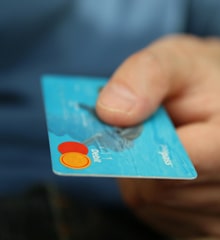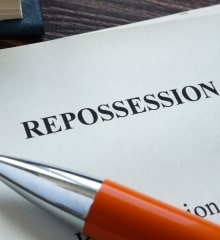Millions of people struggle with bad credit. Some sources recently estimated that 25% of Americans have a poor or very poor credit score. People with low credit scores often find that bad credit makes most financial tasks more difficult, and the options they do have are more expensive.
It’s no wonder that people with poor credit worry about whether they will be able to open a new bank account. The good news is that your credit history typically doesn’t significantly impact your ability to open a bank account. However, if you have a history of negative banking activity, another type of consumer report called a ChexSystems report may come into play.
If you have bad credit, you still have options – there are several bank accounts you can use even if you have poor or very poor credit.

How to cope with bad credit?
Many people have a hard time coping with bad credit. Let’s be honest, if you have bad credit, life can be more difficult. However, it’s important to remember that your credit score is not set in stone. You can improve your credit score with the right tools and consistent effort.
The first step is to understand your credit score. Next, you will need to focus on creating a realistic budget and ensuring your bills are all paid on time. Over time, if you can reduce your overall debt and avoid new credit, you will be able to improve your score.
It’s also important to remember that you are not alone; contacting an attorney or financial professional can help you understand your options so you can get a fresh financial start.
Understand Your Credit:
To understand your credit, you should start by obtaining copies of your credit reports from the major credit bureaus (Equifax, Experian, TransUnion). You can request your credit reports online for free.
It is imperative to review your credit reports thoroughly to check for inaccuracies, errors, and fraud. If there are issues with your credit reports, you can dispute any inaccurate information and have it corrected.
After reviewing your credit reports, you will have a better understanding of what events are hurting your score. This knowledge can help you develop a better strategy to improve your credit history and score.
Create a Budget:
It’s important to create a realistic budget and stick to it.
To start creating a budget, you should list all your sources of income and expenses. You can do this the old-fashioned way with a pencil and paper or online with a spreadsheet. If you’re not sure how to get started, there are several budgeting apps and online tools that can help you track your expenses easily to get a full picture of where your money is going each month.
Once you are able to categorize and analyze your spending, you can better prioritize paying your essential expenses and focus on paying down debt.
Do your best to stick to your budget, but make adjustments as needed. A budget is only beneficial if it’s utilized. Review your budget monthly and track the progress you’ve made toward reaching your financial goals.
Pay Bills on Time:
As you will see on your credit reports, payment history accounts for a significant percentage of your credit score. With that knowledge, you should ensure that all your bills are paid on time each month to prevent any additional negative marks on your credit.
The budget you create can also help you track your bills and ensure you do not miss a payment.
Reduce Debt:
To improve your credit score, you will probably need to reduce your overall debt. It’s wise to focus on paying down high-interest debt like payday loans and credit card debt. By keeping your credit card debt low relative to your credit limit, you can improve your score. Additionally, reducing your debt will ultimately improve your debt-to-income ratio, which also contributes positively to your overall credit score. For some people, debt consolidation can help make their monthly payments more manageable.
Avoid Opening New Credit Accounts:
While you are working to rebuild your credit, you should avoid opening new lines of credit if possible. Opening multiple new accounts may negatively affect your credit score.
To avoid opening new credit accounts, you may want to utilize a debit card or even cash. These options will not only help you avoid opening new lines of credit, but they can also help you stick to your budget by limiting your spending to the money you have available.
Communicate with Creditors:
People often don’t know that they can communicate directly with their creditors. Sometimes, creditors are happy to negotiate a new payment plan or even temporarily reduce payments. Many creditors would rather work with you than try to fight you over debt later.
You can contact your creditors directly to explain your situation, and if you aren’t sure what to say, you can also have a professional negotiate on your behalf.
Build Positive Credit Habits:
Your credit score is simply a reflection of your credit history – it does not predict your future habits. To rebuild your credit history and improve your credit score, you’ll need to develop positive credit habits. By paying your bills on time, keeping credit card balances low, and only opening new lines of credit when necessary, you can rebuild your credit history.
Consider Secured Credit Cards or Credit Builder Loans:
If you are rebuilding your credit and do not want to open a new line of credit, you might want to consider getting a secured credit card or a credit builder loan.
A secured credit card allows you to provide a cash deposit for the credit card. You then use the card like normal and make monthly payments. Over time, you will rebuild your credit history by showing responsible use, including making all payments on time and keeping the balance low.
Credit builder loans work similarly; instead of receiving the loan directly, the money is deposited in a savings account or CD. These types of loans are specifically made for people who need to build or rebuild their credit.
Break Free from Debt
Bad credit doesn’t have to hold you back – our attorneys can help you start fresh.
Get Free Legal Help

Seek Professional Advice:
Trying to deal with bad credit on your own can feel overwhelming. Many people facing bad credit need to seek professional advice. There are numerous professionals who can help. Depending on your situation, you may want to consider consulting with a certified credit counselor, financial advisor, or bankruptcy attorney.
It’s important to remember that you are not alone. A professional can offer guidance on how you can better manage the debt you already have, improve your credit, and create a plan that is uniquely tailored to your financial situation and goals.
Be Patient and Persistent:
Rebuilding damaged credit doesn’t happen overnight. It takes time and effort to improve your score, but if you are patient and persistent, you can improve your credit and your financial future.

How can a lawyer help you with bad credit?
An experienced lawyer can help you understand what is negatively impacting your credit score and ultimately create a plan to help you rebuild your credit. A lawyer can help you dispute credit reports, defend you from unfair or unlawful debt collection practices, and, if appropriate, file bankruptcy on your behalf.
Credit Report Disputes:
If you see any errors on your credit report, an attorney can help you dispute these errors with the credit bureaus and ultimately have any incorrect information corrected or removed. An attorney can review your reports with you, help build your case, and ensure you have the proper evidence or documentation when dealing with the credit bureaus. If there are errors on your report, you should not be punished; an attorney can help guide you through the process quickly and efficiently.
Debt Collection Defense:
It is not unusual for people to fall victim to aggressive or unlawful debt collection practices. You have rights, and an attorney can make sure your rights are protected.
An experienced attorney can represent you in negotiations with creditors or debt collectors and ensure you are treated fairly.
Bankruptcy Advice and Representation:
Bankruptcy is complex, but an experienced bankruptcy lawyer can help review your situation and advise you on your options. If bankruptcy is the right option for you, an attorney can help build your case, file for bankruptcy, and take the necessary steps to put bad credit behind you.
Simply put, if you are facing unmanageable debt, an attorney may be your best bet. An experienced bankruptcy attorney will not judge you; they will help you understand your options and work side by side with you every step of the way.
Credit Counseling and Negotiation:
Some bankruptcy law firms may provide credit counseling services directly, and most bankruptcy law firms will negotiate directly with your creditors and debt collectors.
Legal Advice and Guidance:
A bankruptcy lawyer is your ally. They can help understand your situation, explore your options, and advocate on your behalf. An experienced bankruptcy lawyer can provide legal advice tailored to your specific situation.
Your lawyer will defend your rights and make sure you understand the pros and cons of all your options.
Legal Protection:
A bankruptcy lawyer can help ensure your rights are protected. There are countless cases where people’s rights have been violated, including illegal repossession and harassment. If you have questions, you should contact a lawyer to discuss your situation. Many lawyers will provide a free consultation.
Can You Open a Checking Account With No Credit Check?
Yes. Most banks and credit unions do not check your credit score when you open a new checking account.
However, many banks will review your previous banking history using a ChexSystems report.
It’s important to know that not all banks check your banking history or interpret the score the same way, so if you are turned down by one bank, that doesn’t mean you will get turned down by all financial institutions.
What is ChexSystems?
ChexSystems is a consumer-reporting agency that keeps track of your past banking history. Unlike your credit report, which includes your previous borrowing and repayment history, a ChexSystems report includes information about your previous bank accounts, including unpaid balances, overdrafts, and bounced checks.
Many financial institutions utilize ChexSystems reports when assessing applications from new clients. However, even if you have a bad ChexSystems report, some financial institutions will allow you to open a new account or may offer you an opportunity to open a secured account.
Get Legal Guidance
Worried about opening a bank account with bad credit? Get expert legal guidance and take control today.
Speak to an Expert

The Top 10 Bank Accounts for Bad Credit
If you have bad credit, these 10 banks are worth considering.
-
Chime checking and savings accounts do not run a ChexSystems or credit check. Bonus points for early direct deposit and overdraft protection.
-
Varo bank and savings accounts do not run a ChexSystems or credit check. Bonus points for early direct deposit, no monthly fees, and up to 5% APY savings.
-
Current Spending Account does not run a credit check and provides many free smart features and credit-building add-ons. Bonus points for not requiring a minimum balance and premium options for $5/month.
-
MoneyLion accounts do not require minimum balances. Noteworthy, there is a $1 monthly fee for access to additional features, such as crypto and investments.
-
Betterment accounts provide flexibility without maintaining a certain balance or paying any monthly fees.
-
SoFi offers various financial products, including checking and savings accounts. There are also no balance or maintenance fee obligations.
-
Axos checking accounts require an opening deposit of $50+; however, there are no monthly fees.
-
Aspiration cash management accounts can be opened without meeting a minimum balance requirement. They provide a free option and a Plus account for a small monthly fee.
-
Chase Secure Banking is different from other types of Chase accounts because these accounts do not require a ChexSystems report. Bonus points because there is no minimum balance requirement, but there is a service fee of $5/month.
-
Wells Fargo Clear Access Banking accounts require a $25 opening deposit and a $5 monthly fee. However, this fee is waived if you are under 25 years of age. Bonus points for being considered a “second-chance” bank.







